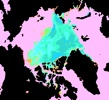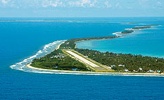 I follow the Arctic sea ice extent at Cryosphere Today. The site publishes pictures, maps and graphs of sea ice in the Arctic and Antarctic, derived from NASA satellite data. They’ve just announced a worrying new record:
I follow the Arctic sea ice extent at Cryosphere Today. The site publishes pictures, maps and graphs of sea ice in the Arctic and Antarctic, derived from NASA satellite data. They’ve just announced a worrying new record:
Today (August 9th), the Northern Hemisphere sea ice area broke the record for the lowest recorded ice area in recorded history. The new record came a full month before the historic summer minimum typically occurs. There is still a month or more of melt likely this year. It is therefore almost certain that the previous 2005 record will be annihilated by the final 2007 annual minima closer to the end of this summer. In previous record sea ice minima years, ice area anomalies were confined to certain sectors (N. Atlantic, Beaufort/Bering Sea, etc). The character of 2007’s sea ice melt is unique in that it is dramatic and covers the entire Arctic sector. Atlantic, Pacific and even the central Arctic sectors are showing large negative sea ice area anomalies.
I find this news disturbing for two reasons. First, the fact that the new record should be set so early in the season. That suggests that there is a lot more melting to go. The second is the language: normally cautious scientists seldom use words like “annihilate
Like this:
Like Loading...
 Researchers at the Hadley Centre in Britain have produced the world’s first short range climate forecast, covering the next ten years. And there are no surprises, it’s going to get warmer. From New Scientist:
Researchers at the Hadley Centre in Britain have produced the world’s first short range climate forecast, covering the next ten years. And there are no surprises, it’s going to get warmer. From New Scientist:



